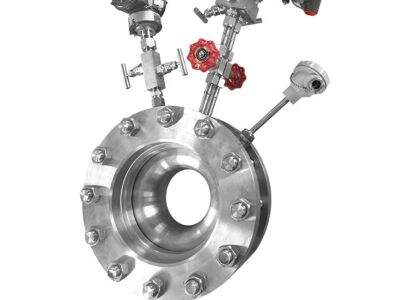What is a flowmeter?
A flowmeter is an extraordinary device that assists in measuring the volume of liquid or gas flowing through a pipe. It is just like a measuring cup, but this one measures the quantity of liquid and gas passing through a pipe. The air flow meter gives us the approximate flow velocity of the liquid or gas. But how? Let's find out together.a
What is the principle of flow measurement of a flowmeter?
What is pressure: Pressure is generated by the flow of either liquids or gas through pipes. This pressure acts as an impelling fluid or gas through the tubing. A flowmeter employs this pressure to find out the flow rate through the pipe. This is generally achieved using the differential pressure method.
In this method, the oxygen flow meter measures pressure at two locations in the pipeline. Now, if there is a higher volume of liquid or gas passing through the pipe, then the difference between the pressure at these two places will be even larger. This implies that the flow is much faster. Then, using this pressure difference, the flowmeter finds the velocity of the liquid or gas passing through the pipe.
What is the significance of flow measurement?
For instance, in oil and gas sectors and in food and beverages sectors, flow measurement is very significant. The basic point of the issue is that in every sector, where smooth flow operation is a must, an understanding of the amount of liquid or gas passing through is required. Excessive gas flow becomes hazardous. When less amount of liquid flows in any factory, production of a product may take more time than scheduled.
But the measurement of flow is not merely taking the number. Instead, it is also understanding the fluid or gas we are measuring. As liquids and gases travel through a pipe, they can behave differently. Some may be thicker, more like honey, while others might be lighter than water. These differences may affect how measured our flow may become. The above allows us to get the best out of measuring.
What is calibration?
The next step, what is very crucial, is the calibration step. It is an at which we calibrate a flowmeter to ensure that the readings are correct. Even the minute errors can yield major problems in the process, so it is a key step.
Calibration is the process of comparing the readings of a flowmeter with a known standard-that is, a measurement we consider trustworthy. However, if the flowmeter figures do not equal this standard, then we can calibrate the flowmeter to fine-tune the readings. However, calibration can be complicated, and usually requires specialized tools and expertise. It is something professional trained people do to ensure everything is right
Flowmeter types
There are many different styles of flowmeter, each with its own strengths and weaknesses. Let's take a look at some common types of flowmeters you may encounter:
Positive displacement flowmeters: Measures how much fluid passes through the meter by counting it. They are highly accurate and excellent for small quantities.
Turbine flowmeters: Determine the number of revolutions per minute of a turbine in the fluid to measure flow. The greater the RPM of the turbine, the more liquid or gas is flowing.
Coriolis flowmetres: These devices determine flow based on the identification of a particular force created by the fluid as it flows through a vibrating tube. These are very useful for mass flow measurements of gases and liquids.
Ultrasonic flowmeters: In this type of flowmeter, sound waves are used to measure flow. They can tell how fast that liquid or gas is moving by sending sound waves through it.
Your application will determine what type of flowmeter you choose. You have to take other things into account too, like cost, how accurate it is, and how reliable it needs to be for the task.
Conclusion
To sum up, understanding how does a digital flow meter work is not an easy thing but for many businesses it is of key importance. WEIBAO offers excellent flowmeters and calibration services with an aim to help everything run just perfect. After that, the proper selection of the right flowmeter according to the application along with its right installation helps improve your processes and output in general. The better you all are informed about flowmeters the better you can collaborate with each other effectively and safely.
 EN
EN
 AR
AR BG
BG HR
HR CS
CS DA
DA NL
NL FI
FI FR
FR DE
DE EL
EL HI
HI IT
IT KO
KO NO
NO PL
PL PT
PT RO
RO RU
RU ES
ES SV
SV CA
CA TL
TL ID
ID LT
LT SR
SR VI
VI HU
HU TH
TH TR
TR MS
MS GA
GA BE
BE MK
MK BN
BN LO
LO LA
LA MN
MN NE
NE MY
MY




